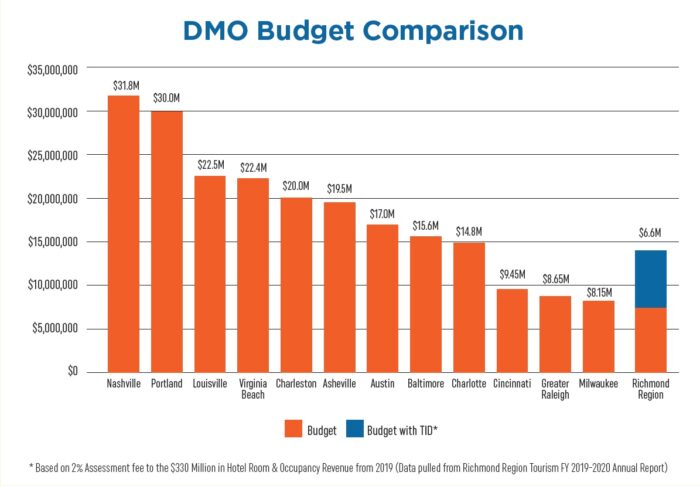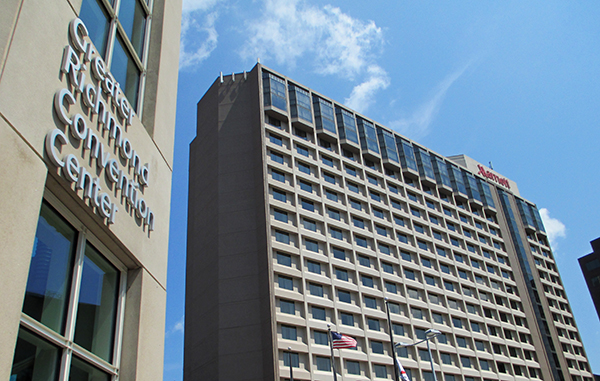Looking to capitalize on a rebound in tourism and lodging in the wake of the pandemic, a group of hotel operators and tourism officials is making a push for a new lodging fee for the region that they say would bring its marketing efforts in line with competitor cities.
Richmond Region Tourism is spearheading the effort that would establish a so-called tourism improvement district (TID), in which hotel visitors would be charged a 2 percent fee on their nightly room rates that would be put toward marketing and sales activities to better promote and attract business to the region.
The additional funding, projected to reach over $8 million in the TID’s first year, would more than double RRT’s annual marketing budget, which currently stands at $6.6 million. It also would bring it more to the level of competitive markets, such as Charlotte, Baltimore and Austin, Texas, according to RRT data.
“We have been marketing the area for a long time and we’ve done really well with the resources that we have. However, when we look at our competitors, we are under-resourced compared to them,” said Katherine O’Donnell, RRT’s executive vice president leading the effort.
“Part of this is really about level-setting our resources against people that we compete with, both in Virginia and outside of Virginia, and knowing that we have come back well from COVID but there is still room for growth,” O’Donnell said.
According to RRT, hotel occupancy in the region has been hovering just below 70 percent, signaling a return to pre-pandemic business levels. Last year, revenues from lodging occupancy taxes in metro Richmond exceeded a previous record set in fiscal year 2019, before the pandemic rocked the hospitality industry.
While a newer concept in Virginia, TIDs have been established in 19 states with nearly 200 in place across the country, O’Donnell said. The General Assembly passed a law in 2021 allowing Virginia localities to pursue a TID, so long as a majority of hotel operators in a locality petition for it.
Because RRT’s TID would consist of multiple localities, reflecting the nonprofit’s service area as a regional marketing organization, support from at least 51 percent of operators in each locality is required. O’Donnell said such support has been secured for Richmond, Chesterfield, Hanover, Henrico and Ashland, which would make up the TID along with Colonial Heights.
O’Donnell said a majority has yet to be reached for Colonial Heights, but is expected with the opening of a new hotel there, which she said would change the ownership makeup in the city and bring it over the 51 percent threshold. She said she’s heard from one operator there who’s opposed to the TID.
RRT’s service area also includes New Kent, which has bed-and-breakfast lodging but no hotels. Under the legislation, the 2 percent assessments under a TID would apply only to hotels with more than 41 rooms.
With those petitions lined up, RRT is in the process of getting public hearings scheduled this spring with each jurisdiction, with the goal of getting the TID approved and in place by July 1. The 2 percent fees would take effect thereafter, with collections starting in August and coming to RRT as early as September.
The fees would be charged on top of the 8 percent lodging occupancy tax currently levied across the region. While those revenues go to the respective jurisdiction, O’Donnell noted that the 2 percent fee would go specifically toward tourism marketing, with oversight by a subcommittee of RRT’s board made up of industry representatives.
“They will be approving a work plan and budget every year. That’s part of the reason the hotels really love this, because they know that they have influence on how the money is being spent, and the money legally has to benefit them,” O’Donnell said.

A comparison by Richmond Region Tourism shows its annual marketing budget compared to competitor cities.
Beyond traditional marketing and promotional campaigns, options for using the funds include providing incentives for large-scale events to book area venues, such as the Greater Richmond Convention Center, Chesterfield’s River City Sportsplex and Henrico’s upcoming indoor sports arena at Virginia Center Commons.
“We have these great facilities already, but to bring in more events to fill those costs money. This will allow us to raise funds to have the wherewithal to bid on high-profile events, particularly sporting events and large conventions that cost a lot to host and to bid on,” O’Donnell said.
Other options include marketing and sales initiatives aimed at luring leisure travelers and tourism to the region. O’Donnell said such a campaign is in the works for this spring with funds that the region received through federal pandemic relief dollars.
“Once that money runs out, then the TID will be able to pick it up and carry it forward into the future, so we will be maintaining our market share and be able to reach markets that are farther away than we can now,” she said.
Once established, the TID would be in effect for a 10-year term, which could be renewed or ended early by a majority petition. If the TID is not approved by one of the localities, O’Donnell said the larger TID effort could still go forward with the jurisdictions that approve it.
In the works for over a year, the TID effort has been steered by a committee that included Neil Amin, CEO of Shamin Hotels; John Cario, general manager of Hilton Richmond Downtown; Nick Patel, president of Kalyan Hospitality; Robert Reed, vice president of SMI Hotel Group; and Ashley Lowrey, an executive with Apple Hospitality REIT.
Cario, who also credited Eric Terry with the Virginia Restaurant, Lodging & Travel Association for getting the effort going, said the 2 percent assessment would benefit the region by drawing more visitors and economic activity here.
“Many cities where our company has hotels across the country have this TID in place already. It’s important to assist the marketing dollars of local tourism, to continue to put heads in beds and help out the hotels and the local economy,” Cario said.
An RRT comparison with competitive cities put the marketing budget for Charlotte at $14.8 million, Baltimore at $15.6 million, and Austin at $17 million. The TID would bring RRT’s budget closer to those, and above the budgets for Milwaukee, Cincinnati and the Raleigh area. Nashville’s budget topped the list at $31.8 million.
“When you see the comparison to other cities, we’re pretty far behind what we would need to go out and market Richmond,” Cario said. “Especially with the new sports venues coming into town, there’s incentive fees to secure some of those pieces of business.”
Added O’Donnell: “This will be a game changer for us, because we’re talking about in essence doubling what Richmond Region Tourism has access to for resources for marketing and sales. It’s a significant impact on what we’ll be able to do in terms of driving more people to come here, which is really good for our economy, good for our citizens, good for quality of life.”
Looking to capitalize on a rebound in tourism and lodging in the wake of the pandemic, a group of hotel operators and tourism officials is making a push for a new lodging fee for the region that they say would bring its marketing efforts in line with competitor cities.
Richmond Region Tourism is spearheading the effort that would establish a so-called tourism improvement district (TID), in which hotel visitors would be charged a 2 percent fee on their nightly room rates that would be put toward marketing and sales activities to better promote and attract business to the region.
The additional funding, projected to reach over $8 million in the TID’s first year, would more than double RRT’s annual marketing budget, which currently stands at $6.6 million. It also would bring it more to the level of competitive markets, such as Charlotte, Baltimore and Austin, Texas, according to RRT data.
“We have been marketing the area for a long time and we’ve done really well with the resources that we have. However, when we look at our competitors, we are under-resourced compared to them,” said Katherine O’Donnell, RRT’s executive vice president leading the effort.
“Part of this is really about level-setting our resources against people that we compete with, both in Virginia and outside of Virginia, and knowing that we have come back well from COVID but there is still room for growth,” O’Donnell said.
According to RRT, hotel occupancy in the region has been hovering just below 70 percent, signaling a return to pre-pandemic business levels. Last year, revenues from lodging occupancy taxes in metro Richmond exceeded a previous record set in fiscal year 2019, before the pandemic rocked the hospitality industry.
While a newer concept in Virginia, TIDs have been established in 19 states with nearly 200 in place across the country, O’Donnell said. The General Assembly passed a law in 2021 allowing Virginia localities to pursue a TID, so long as a majority of hotel operators in a locality petition for it.
Because RRT’s TID would consist of multiple localities, reflecting the nonprofit’s service area as a regional marketing organization, support from at least 51 percent of operators in each locality is required. O’Donnell said such support has been secured for Richmond, Chesterfield, Hanover, Henrico and Ashland, which would make up the TID along with Colonial Heights.
O’Donnell said a majority has yet to be reached for Colonial Heights, but is expected with the opening of a new hotel there, which she said would change the ownership makeup in the city and bring it over the 51 percent threshold. She said she’s heard from one operator there who’s opposed to the TID.
RRT’s service area also includes New Kent, which has bed-and-breakfast lodging but no hotels. Under the legislation, the 2 percent assessments under a TID would apply only to hotels with more than 41 rooms.
With those petitions lined up, RRT is in the process of getting public hearings scheduled this spring with each jurisdiction, with the goal of getting the TID approved and in place by July 1. The 2 percent fees would take effect thereafter, with collections starting in August and coming to RRT as early as September.
The fees would be charged on top of the 8 percent lodging occupancy tax currently levied across the region. While those revenues go to the respective jurisdiction, O’Donnell noted that the 2 percent fee would go specifically toward tourism marketing, with oversight by a subcommittee of RRT’s board made up of industry representatives.
“They will be approving a work plan and budget every year. That’s part of the reason the hotels really love this, because they know that they have influence on how the money is being spent, and the money legally has to benefit them,” O’Donnell said.

A comparison by Richmond Region Tourism shows its annual marketing budget compared to competitor cities.
Beyond traditional marketing and promotional campaigns, options for using the funds include providing incentives for large-scale events to book area venues, such as the Greater Richmond Convention Center, Chesterfield’s River City Sportsplex and Henrico’s upcoming indoor sports arena at Virginia Center Commons.
“We have these great facilities already, but to bring in more events to fill those costs money. This will allow us to raise funds to have the wherewithal to bid on high-profile events, particularly sporting events and large conventions that cost a lot to host and to bid on,” O’Donnell said.
Other options include marketing and sales initiatives aimed at luring leisure travelers and tourism to the region. O’Donnell said such a campaign is in the works for this spring with funds that the region received through federal pandemic relief dollars.
“Once that money runs out, then the TID will be able to pick it up and carry it forward into the future, so we will be maintaining our market share and be able to reach markets that are farther away than we can now,” she said.
Once established, the TID would be in effect for a 10-year term, which could be renewed or ended early by a majority petition. If the TID is not approved by one of the localities, O’Donnell said the larger TID effort could still go forward with the jurisdictions that approve it.
In the works for over a year, the TID effort has been steered by a committee that included Neil Amin, CEO of Shamin Hotels; John Cario, general manager of Hilton Richmond Downtown; Nick Patel, president of Kalyan Hospitality; Robert Reed, vice president of SMI Hotel Group; and Ashley Lowrey, an executive with Apple Hospitality REIT.
Cario, who also credited Eric Terry with the Virginia Restaurant, Lodging & Travel Association for getting the effort going, said the 2 percent assessment would benefit the region by drawing more visitors and economic activity here.
“Many cities where our company has hotels across the country have this TID in place already. It’s important to assist the marketing dollars of local tourism, to continue to put heads in beds and help out the hotels and the local economy,” Cario said.
An RRT comparison with competitive cities put the marketing budget for Charlotte at $14.8 million, Baltimore at $15.6 million, and Austin at $17 million. The TID would bring RRT’s budget closer to those, and above the budgets for Milwaukee, Cincinnati and the Raleigh area. Nashville’s budget topped the list at $31.8 million.
“When you see the comparison to other cities, we’re pretty far behind what we would need to go out and market Richmond,” Cario said. “Especially with the new sports venues coming into town, there’s incentive fees to secure some of those pieces of business.”
Added O’Donnell: “This will be a game changer for us, because we’re talking about in essence doubling what Richmond Region Tourism has access to for resources for marketing and sales. It’s a significant impact on what we’ll be able to do in terms of driving more people to come here, which is really good for our economy, good for our citizens, good for quality of life.”






I love this idea and I’m shocked with Richmond being one of if not the most historic city in the United States that our tourism budget is so disproportionately lower than our comparable cities let alone with less historical and natural tourism draws. Almost makes me wonder what the Richmond tourism scene would be like with the budget of Virginia Beach over the past 20 years. I am glad almost all localities have the majority of the hotel operators support. Pretty sure Neil Shamin is a big chunk of that support.
We tore down our history, Mr. Willis. We are no longer a “most historic city.”
Hmmm…Tredegar? Still there. Belle Isle? Still there. Poe Museum, White House of the Confederacy, Jackson Ward? St. John’s Church and “The View that named Richmond?” Right where we left them. While we may not celebrate some aspects of history, Richmond is still an incredibly historic city.
It’s time to move on from the post-reconstruction statues. They weren’t even that old, all things considered. And the history is still there- You can even still read about it. We didn’t burn all the books.
So let me get this straight. You tear down the Monuments in the City of Monuments, spray graffiti everywhere and charge people more to come see it? Genius
Seems like a fine idea if the hotels support it, but let’s call it what it is — a tax. A fee is a flat rate that is added to something regardless of its cost. A tax is a percentage.